Key takeaways:
- Effective questioning fosters dialogue and understanding, transforming discussions from one-sided lectures to meaningful exchanges.
- Open-ended questions encourage exploration and collaboration, while closed questions provide clarity on specific information.
- Framing questions thoughtfully and utilizing silence can enhance the quality of dialogue and lead to deeper insights.
- Creating a culture that values contributions and promoting a safe environment can help overcome barriers to effective questioning.
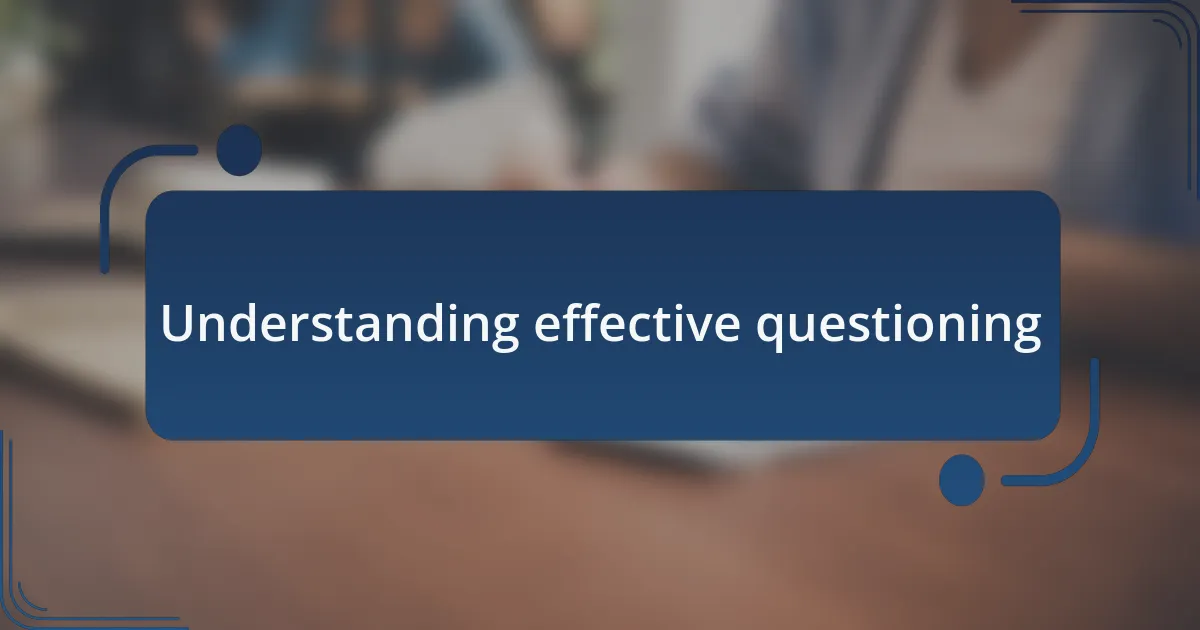
Understanding effective questioning
Effective questioning is more than just asking for information; it’s about fostering dialogue and understanding. I recall a particularly enlightening conversation with a mentor, where the simple question “What do you think?” opened up a wealth of insights I hadn’t considered before. It made me realize how the questions we ask can shape discussions, turning a one-sided lecture into a meaningful exchange.
When I think about the impact of well-structured questions, I remember a team meeting where I used open-ended queries to explore problem-solving options. The atmosphere shifted as participants began to contribute their thoughts freely, each question acting as a springboard for deeper exploration. Isn’t it fascinating how a well-placed question can invite collaboration and creativity?
In my experience, effective questioning often involves a blend of curiosity and empathy. A few years ago, I faced a challenging situation with a colleague who seemed disengaged. By gently probing with questions that acknowledged their feelings, we uncovered underlying issues that transformed our working relationship. Isn’t it intriguing how understanding someone’s perspective can lead to breakthroughs in communication?
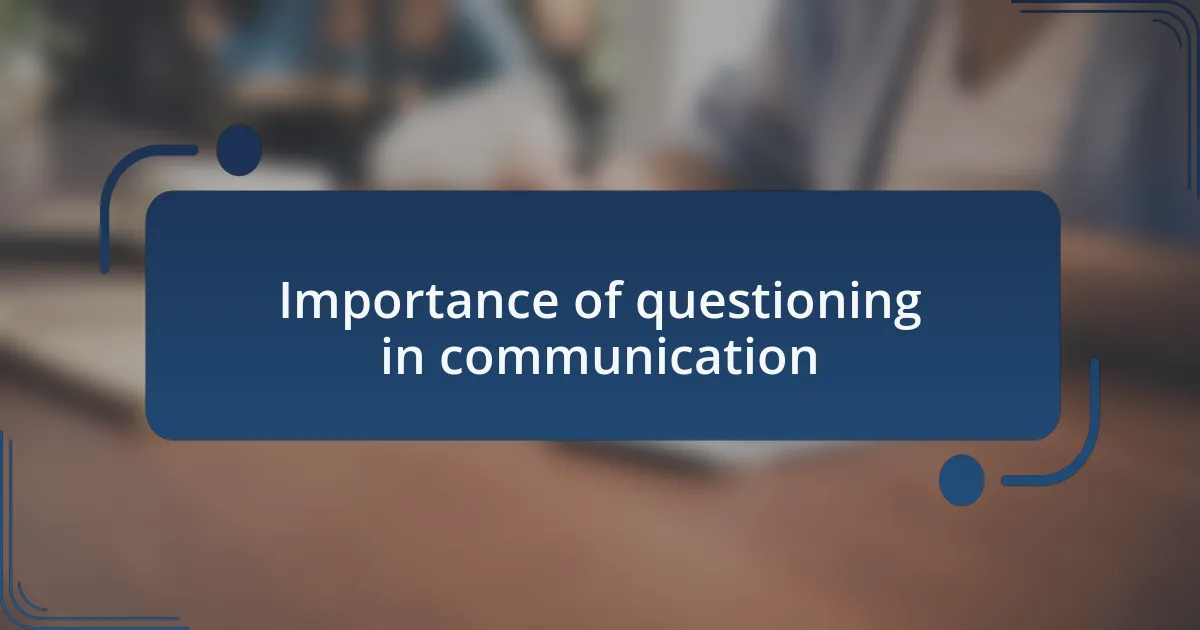
Importance of questioning in communication
Effective questioning not only clarifies information but also cultivates connection. I remember a group project where I asked my peers, “What challenges do you foresee?” This simple question opened the floodgates to discussions about our concerns and fears, transforming what could have been a tense atmosphere into a supportive brainstorming session. Isn’t it incredible how the right question can make someone feel heard and valued?
The importance of questioning goes beyond just gathering facts; it’s also about building trust. During a tough negotiation, I focused on asking questions that encouraged my counterpart to share their motivations. As they opened up, I realized that by understanding their needs, we could find common ground more easily. How often do we miss opportunities simply because we don’t take the time to inquire thoughtfully?
In my view, questioning inspires reflection and deep thinking. At a recent workshop, I prompted attendees to consider, “How does this apply in your daily life?” The ensuing dialogue revealed personal stories that resonated with everyone, creating a powerful ripple effect of shared experiences. Isn’t it amazing how a single question can lead to a deeper understanding of not only the topic at hand but also our collective human experience?
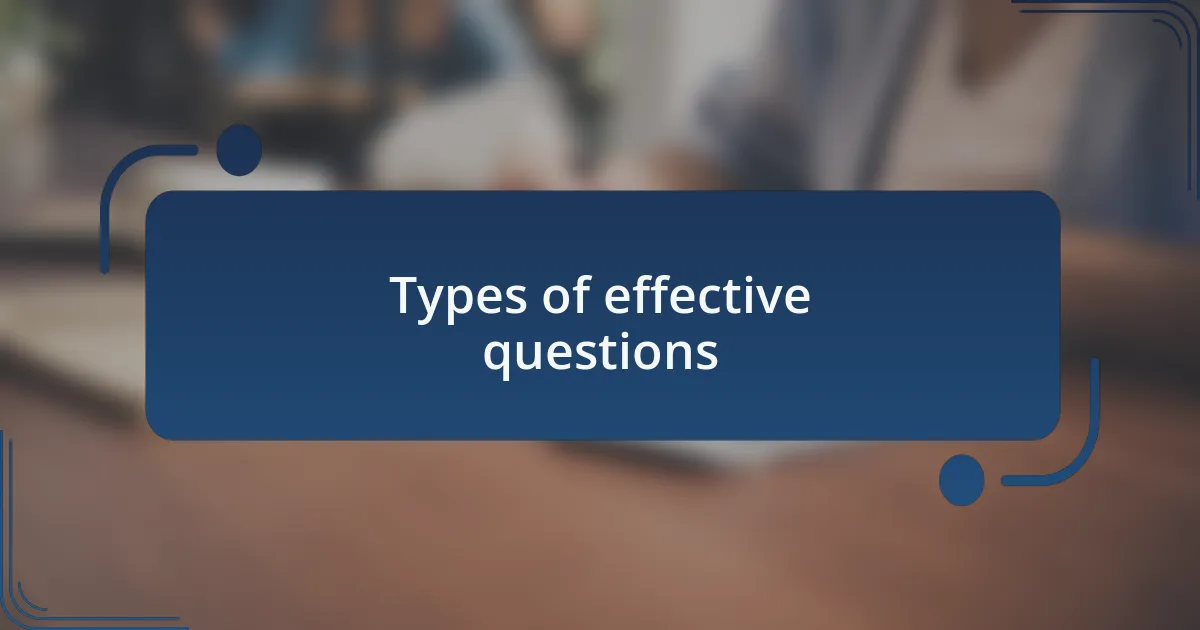
Types of effective questions
Effective questions can be categorized, and each type serves a unique purpose in enhancing communication. For instance, open-ended questions invite expansive conversation and exploration, allowing others to share their thoughts freely. I often ask, “What are your thoughts on this approach?” This question not only invites people to express their opinions but also reveals their values and motivations. How often have you found that such questions unveil insights you hadn’t anticipated?
On the other hand, closed questions play a crucial role when seeking specific information. These questions typically elicit a succinct “yes” or “no” response, which can be useful in gathering quick facts. For example, during a team meeting, I once asked, “Have you completed your parts of the project?” While it didn’t foster a deep discussion, it provided clarity on individual responsibilities and timelines. Isn’t it fascinating how the context can determine the value of a question?
Moreover, probing questions can dig deeper into someone’s initial responses, encouraging them to elaborate. I remember engaging a colleague with, “What led you to that conclusion?” This not only clarified their reasoning but also revealed layers of thought that I had not previously considered. Have you ever noticed how a simple probe can shift the focus from surface-level answers to profound reflections? It’s moments like these that can enrich our conversations significantly.
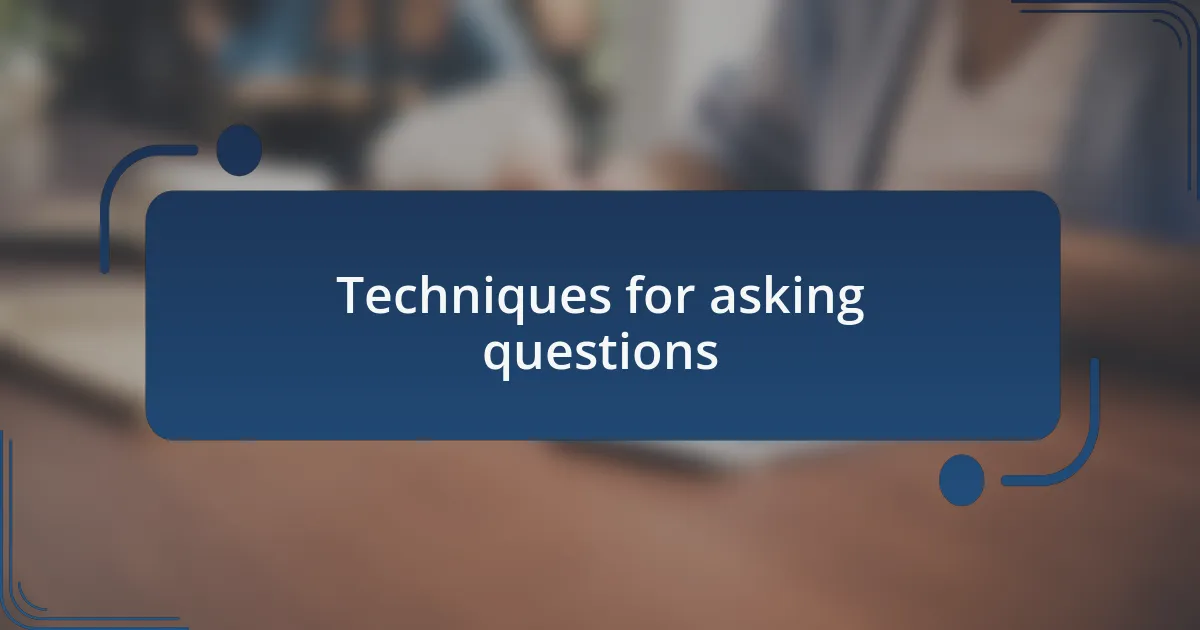
Techniques for asking questions
One effective technique for asking questions is the art of framing. I recall a time when I was leading a workshop and posed the question, “What challenges do you face in your role?” By framing it around challenges, I encouraged participants to share their struggles, fostering a supportive environment. Have you ever noticed how the way we frame a question can set the mood for the entire conversation?
Another technique that I find invaluable is the use of follow-up questions. After someone shares an initial thought, I often say, “Can you tell me more about that?” This simple prompt creates an opportunity for deeper dialogue and often leads to unexpected insights. It’s fascinating how a single follow-up can spark a richer understanding, don’t you think?
Additionally, I’ve discovered the power of silence after asking a question. I remember being in a discussion where I asked a particularly thought-provoking question and then paused to let the silence linger. That moment allowed others to reflect and often resulted in more thoughtful responses. How often do we rush to fill the silence instead of letting it inspire deeper thinking?
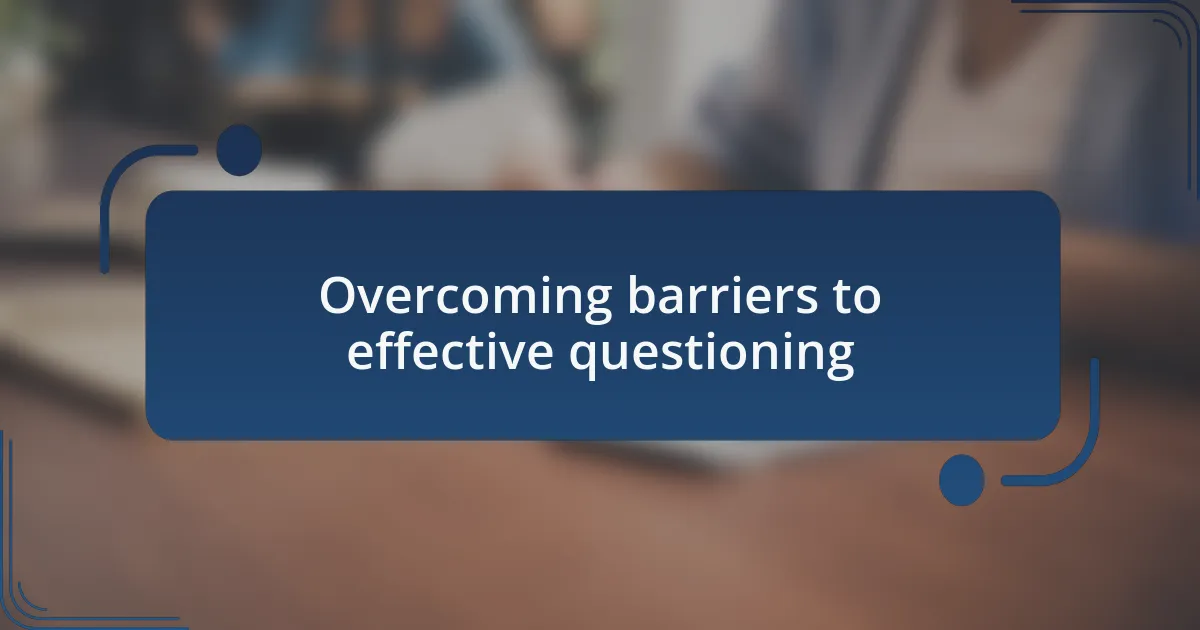
Overcoming barriers to effective questioning
I’ve often encountered barriers to effective questioning, particularly when fear of judgment hangs in the air. I once saw a colleague hesitate to voice their thoughts during a team meeting, worried about how others would react. This discomfort stifles honest dialogue. Have you experienced a similar situation? Creating a culture that values every contribution can help overcome this hurdle.
In another workshop, I noticed a participant struggling to articulate their viewpoint due to a lack of confidence. By openly acknowledging that it’s perfectly okay to stumble through a response, I made it clear that vulnerability is part of learning. I believe that promoting a safe space for inquiry can empower individuals to express themselves freely. How might we foster such an environment in our communications?
Time constraints can also hinder effective questioning. I remember a fast-paced discussion where I felt rushed to get to the next topic, which limited our exploration of important insights. Allowing sufficient time for questions not only encourages deeper reflection but also demonstrates respect for the perspectives shared. If we consider the value of each question and response, wouldn’t it make sense to prioritize time for meaningful dialogue?
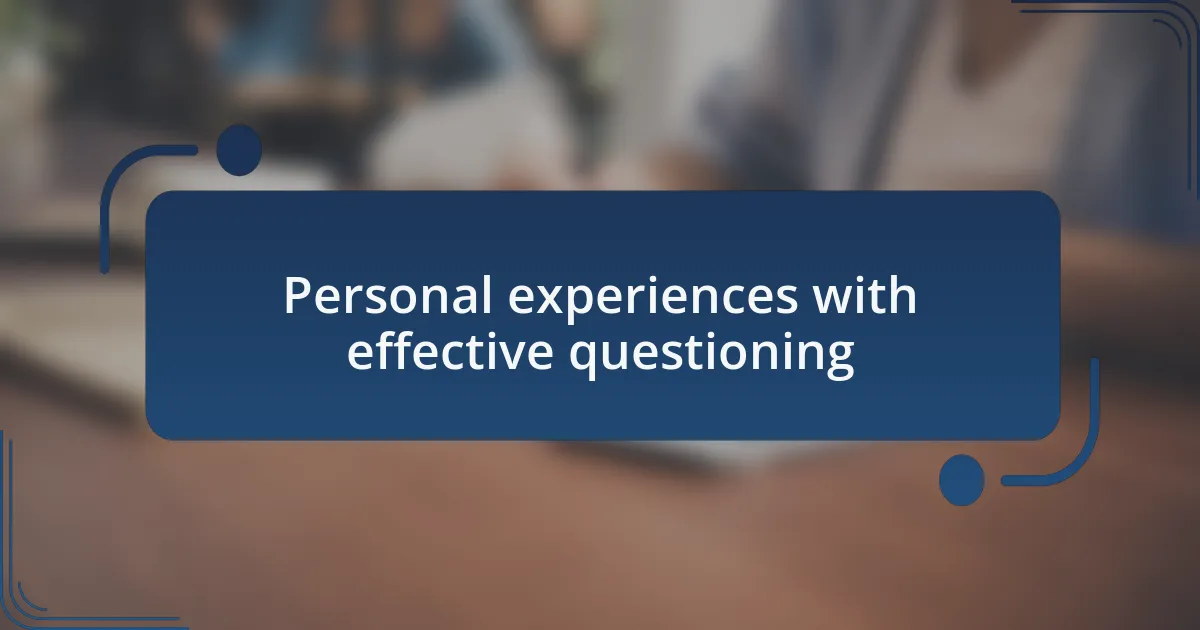
Personal experiences with effective questioning
Effective questioning has often led me to deeper insights in both my personal and professional life. I recall a time during a project review, when I decided to ask a colleague about their rationale behind a particular approach. Their eyes lit up as they explained their thought process, revealing layers of creativity I hadn’t considered. It was a reminder of how powerful an open-ended question can be in unlocking someone’s perspective. Have you ever felt that spark of connection when someone truly listens to your ideas?
There was another occasion during a networking event where I posed a simple question about someone’s career journey. The floodgates opened as they shared their challenges and triumphs. I found it fascinating how a genuinely curious question can transform a mundane conversation into a meaningful exchange. It made me realize that asking the right questions not only shows interest but also builds authentic relationships. How can we harness this power of inquiry to enrich our interactions?
Reflecting on my experiences, I’ve noticed that effective questioning often stems from genuine curiosity. I recall feeling limited when I asked surface-level questions that led nowhere. However, when I dared to dig deeper by asking “why” and “how,” the dialogue flourished. It’s incredible how much more information and understanding can surface when we challenge ourselves to inquire beyond the obvious. Isn’t it worth the effort to enhance our communication by seeking deeper understanding?